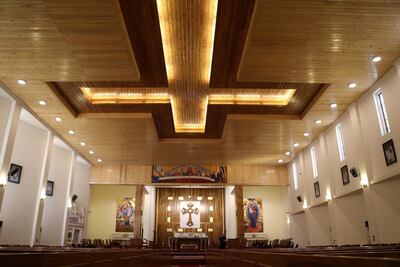In less than two decades, Iraq's Christian community shrunk from more than 1.5 million to a few hundred thousand. War, bloodshed, persecution ands economic stagnation forced most of the community to seek a new future abroad.
On Friday, Pope Francis plans to shine a light on one of the most diverse and longstanding Christian communities in the world as he embarks on a historic pilgrimage across the country.
Iraq, a Muslim majority country of just more than 40 million, has 14 registered Christian sects from a range of churches, but Chaldeans and other Catholic denominations make up about half of the 400,000-strong community. Armenian Orthodox and Protestant make up a sizeable proportion of the others.
Most live near Baghdad or in the northern Nineveh Plains and Kurdistan Region.
Assyrian Christians, Chaldeans and Syriac share a common ethnicity rooted in the Mesopotamian empires that grew in the fertile lands between the Tigris and Euphrates rivers.
Some trace their roots to the Assyrians and Babylonians and embraced Christianity in the first century AD.
While the Chaldeans and Eastern-rite Catholics are autonomous from Rome, they recognise the pope's authority.
Some still speak the oldest language still in use in the world – Aramaic, the language spoken by Jesus.
According to the early church historian Eusebius, who lived through this time, Christianity flourished during the first century. Eusebius claimed to have translated letters between a Mesopotamian king and Jesus.
Thomas, one of the Twelve Apostles, sent Thaddeus, an early Jewish convert, to Mesopotamia to preach the gospel.
The patriarch Abraham is thought to be from Ur, the ancient city of the Sumer in Iraq's south – and a stop on the pope's visit.
But in recent years, the Middle East's Christian population has been on the decline as the region was ravaged by war and extremism.
Under former dictator Saddam Hussain, the Christian community was largely safe despite widespread human rights abuses against other minorities as well as the brutal police state that he oversaw. But religious freedoms were still curtailed.

But after the 2003 US-led invasion toppled the long-time ruler, Iraq descended into chaos as militias and militants ran amok, carrying out killings and massacres.
On October 31, 2010, Al Qaeda gunmen stormed the Lady of Salvation Assyrian Catholic Church, killing 58, including two priests, in a four-hour attack that left the religious sanctuary scared and broken.
It was just one of the dozens of churches attacked during the early 2000s, one of many such assaults singling out Iraq’s Christians.
Then in 2014, ISIS crossed the border from Syria, where it had built a brutal proto state. Intolerant of minorities, it killed, brutalised or oppressed Christians and other religious groups.
Accurate measures of the country’s Christian population are hard to come by. But, by most measures, by the time ISIS was defeated in Iraq in 2017, the population was more diminished than it had ever been.
The Vatican this week described the trip as an “act of love for this land, for its people and for its Christians”.
“An entire community and an entire country will be able to follow this journey through the media and know that the pope is there for them, bringing a message that it is possible to hope even in situations that are most complicated,” spokesman Matteo Bruni said.
















